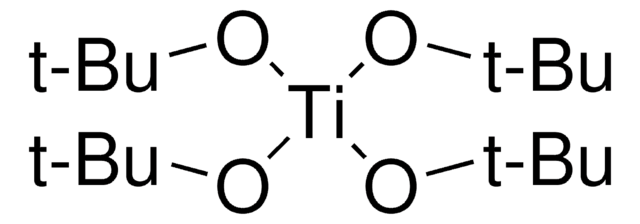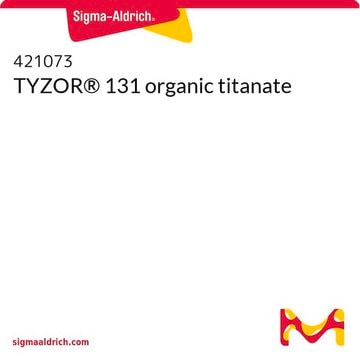244112
Titanium(IV) butoxide
reagent grade, 97%
Synonym(s):
Orthotitanic acid tetrabutylester, TNBT, TYZOR® TBT organic titanate, Tetrabutyl orthotitanate, Tetrabutyl titanate
About This Item
Recommended Products
grade
reagent grade
Assay
97%
form
liquid (or viscous liquid)
liquid
reaction suitability
core: titanium
reagent type: catalyst
refractive index
n20/D 1.491 (lit.)
bp
206 °C/10 mmHg (lit.)
density
1.00 g/mL at 20 °C (lit.)
SMILES string
CCCCO[Ti](OCCCC)(OCCCC)OCCCC
InChI
1S/4C4H9O.Ti/c4*1-2-3-4-5;/h4*2-4H2,1H3;/q4*-1;+4
InChI key
YHWCPXVTRSHPNY-UHFFFAOYSA-N
Looking for similar products? Visit Product Comparison Guide
Application
Legal Information
Signal Word
Danger
Hazard Statements
Precautionary Statements
Hazard Classifications
Eye Dam. 1 - Flam. Liq. 3 - Skin Irrit. 2 - STOT SE 3
Target Organs
Central nervous system, Respiratory system
Storage Class Code
3 - Flammable liquids
WGK
WGK 1
Flash Point(F)
107.6 °F - Pensky-Martens closed cup
Flash Point(C)
42 °C - Pensky-Martens closed cup
Personal Protective Equipment
Certificates of Analysis (COA)
Search for Certificates of Analysis (COA) by entering the products Lot/Batch Number. Lot and Batch Numbers can be found on a product’s label following the words ‘Lot’ or ‘Batch’.
Already Own This Product?
Find documentation for the products that you have recently purchased in the Document Library.
Customers Also Viewed
Our team of scientists has experience in all areas of research including Life Science, Material Science, Chemical Synthesis, Chromatography, Analytical and many others.
Contact Technical Service














